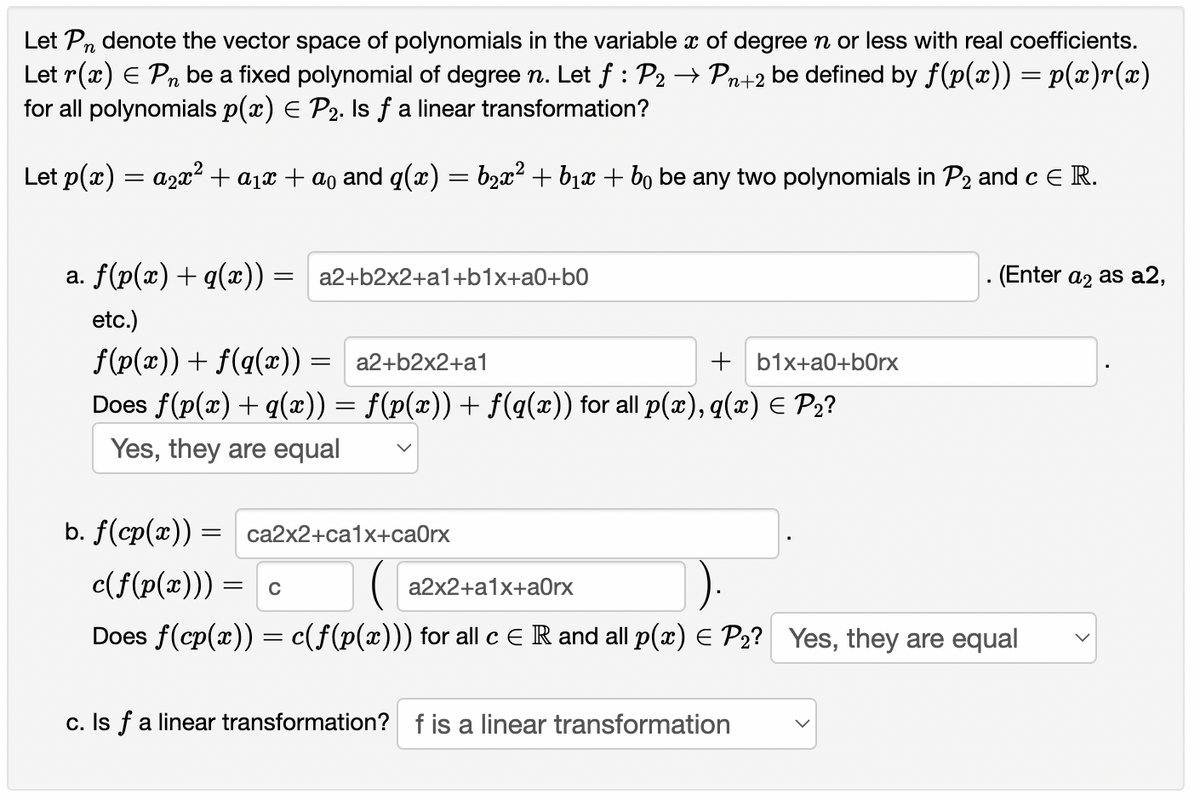Let Pn denote the vector space of polynomials in the variable x of degree n or less with real coefficients. Let r(x) E Pn be a fixed polynomial of degree n. Let f : P2 → Pn+2 be defined by f (p(x)) = p(x)r(x) for all polynomials p(x) E P2. Is fa linear transformation? Let p(x) = a2x² + a1x + ao and q(x) = b2x² + b1x + bo be any two polynomials in P2 and c E R. a. f(p(x) + q(x)) = a2+b2x2+a1+b1x+a0+b0 (Enter a2 as a2, etc.) f(p(x)) + f(q(x))= + b1x+a0+b0rx a2+b2x2+a1 Does f(p(x) + q(æ)) = f(p(x)) + f(q(x)) for all p(x), q(x) E P2? Yes, they are equal b. f(cp(x)) = ca2x2+ca1x+caOrx c(f(p(x))) = a2x2+a1x+aOrx Does f(cp(x)) = c(f(p(x))) for all c E R and all p(x) E P2? Yes, they are equal c. Is f a linear transformation? f is a linear transformation
Let Pn denote the vector space of polynomials in the variable x of degree n or less with real coefficients. Let r(x) E Pn be a fixed polynomial of degree n. Let f : P2 → Pn+2 be defined by f (p(x)) = p(x)r(x) for all polynomials p(x) E P2. Is fa linear transformation? Let p(x) = a2x² + a1x + ao and q(x) = b2x² + b1x + bo be any two polynomials in P2 and c E R. a. f(p(x) + q(x)) = a2+b2x2+a1+b1x+a0+b0 (Enter a2 as a2, etc.) f(p(x)) + f(q(x))= + b1x+a0+b0rx a2+b2x2+a1 Does f(p(x) + q(æ)) = f(p(x)) + f(q(x)) for all p(x), q(x) E P2? Yes, they are equal b. f(cp(x)) = ca2x2+ca1x+caOrx c(f(p(x))) = a2x2+a1x+aOrx Does f(cp(x)) = c(f(p(x))) for all c E R and all p(x) E P2? Yes, they are equal c. Is f a linear transformation? f is a linear transformation
Linear Algebra: A Modern Introduction
4th Edition
ISBN:9781285463247
Author:David Poole
Publisher:David Poole
Chapter6: Vector Spaces
Section6.5: The Kernel And Range Of A Linear Transformation
Problem 4EQ
Related questions
Question

Transcribed Image Text:Let Pn denote the vector space of polynomials in the variable x of degreen or less with real coefficients.
Let r(x) E Pn be a fixed polynomial of degree n. Let f : P2 → Pn+2 be defined by f(p(x)) = p(x)r(x)
for all polynomials p(x) E P2. Is fa linear transformation?
Let p(x) = a2x? + a1x + ao and q(x) = b,x² + b1x + bo be any two polynomials in P2 and c E R.
a. f(p(x) + q(x)) = a2+b2x2+a1+b1x+a0+b0
(Enter a2 as a2,
etc.)
f(p(x)) + f(q(x))
a2+b2x2+a1
+ b1x+a0+b0rx
Does f(p(x)+ q(x')) = f(p(x)) + f(q(x)) for all p(x), q(æ) E P2?
Yes, they are equal
b. f(cp(x)) =
са2x2+са1x+саOrx
c(f(p(x))) = c
( a2x2+a1x+aOrx
Does f(cp(x)) = c(f(p(x))) for all c ER and all p(x) E P2? Yes, they are equal
c. Is f a linear transformation? f is a linear transformation
Expert Solution
This question has been solved!
Explore an expertly crafted, step-by-step solution for a thorough understanding of key concepts.
This is a popular solution!
Trending now
This is a popular solution!
Step by step
Solved in 2 steps with 2 images

Recommended textbooks for you

Linear Algebra: A Modern Introduction
Algebra
ISBN:
9781285463247
Author:
David Poole
Publisher:
Cengage Learning

Elementary Linear Algebra (MindTap Course List)
Algebra
ISBN:
9781305658004
Author:
Ron Larson
Publisher:
Cengage Learning

Linear Algebra: A Modern Introduction
Algebra
ISBN:
9781285463247
Author:
David Poole
Publisher:
Cengage Learning

Elementary Linear Algebra (MindTap Course List)
Algebra
ISBN:
9781305658004
Author:
Ron Larson
Publisher:
Cengage Learning